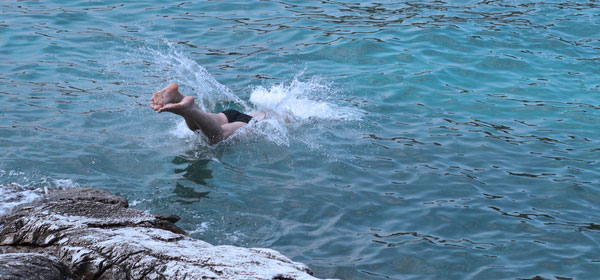I’m determined to swim my way through winter. I live in Melbourne, by the bay, and I’ve done it before. I swear it boosts the immune system, shocks the germs to abandon ship – and who wouldn’t want that? My work colleague Leon has a totally different approach, but more of that later.
Yes, swimming in winter can hurt. In July and August when the water temperature in Port Phillip Bay averages anywhere between 13 and 15°C, the ‘brain explosion’ that accompanies that first dive is a thing to experience. But how amazing do you feel when you get out! The key is to get out before you succumb to hypothermia.
I’m not suggesting this is for everyone and obviously further research is required, but in my one year of swimming, I was unaffected by the smorgasbord of colds and flus on offer.
Back to Leon. He wages war on germs by attempting to sweat them out, layering up at night with multiple sweaters and trackies and socks and a beanie and doonas. He swears it works.
Then there is the combination approach favoured by Scandinavian types where you alternate between sauna and icy water or snow.
The Conversation reports: “There is no doubt that the physiological responses to immersion in cold water are dangerous, and are precursors to sudden heart attack, the loss of capacity to swim, hypothermia and drowning.”
The ‘cold shock’ response, health experts warn, can place a strain on the heart, and the sudden loss of control over breathing, leading to gasping, means that the likelihood of breathing in water, even the small volume necessary to drown, is significantly increased.
However …
On the plus side, says The Conversation, there is no doubt that a cold dip stimulates the body when it releases stress hormones that give that feeling of being really ‘alive’.
And immunity? Some laboratory studies have reported improved markers of immune function, but they’re inconclusive.
“For example,” says The Conversation, “upper respiratory tract infection is often used as a useful measure of immune system functioning: open, cold water swimmers have been found to have fewer infections than their non-swimming partners, but no fewer infections than indoor swimmers. And herein lies one of the problems with the ‘benefits’ side of the cold water debate: the properly controlled experiments that isolate cold water immersions from socialising, exercise, getting fitter, taking exercise in nature (so-called ‘green’ therapy) and other activity that add complicating variables simply haven’t been done.”
The case for sweating? Again, inconclusive. Some research says that raising your temperature kicks your immune system into high gear and helps your body sweat out toxins and impurities.
But we really don’t know. Just get that flu shot.
Disclaimer: Consult your medical practitioner before considering whether to try either of these approaches.
Have you tried cold or heat to boost your immune system? Did it work?
Related articles:
Are you weakening your immunity?
Foods that are bad for your brain
Are probiotics doing you harm?

